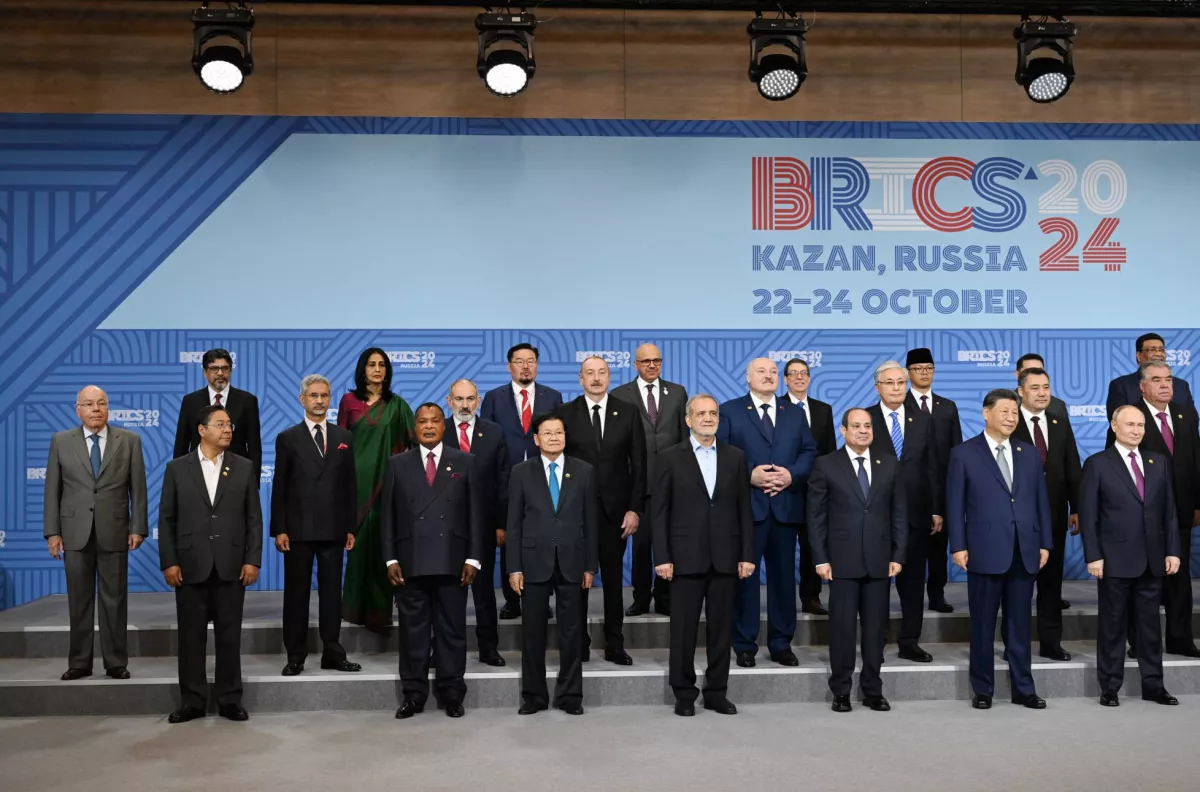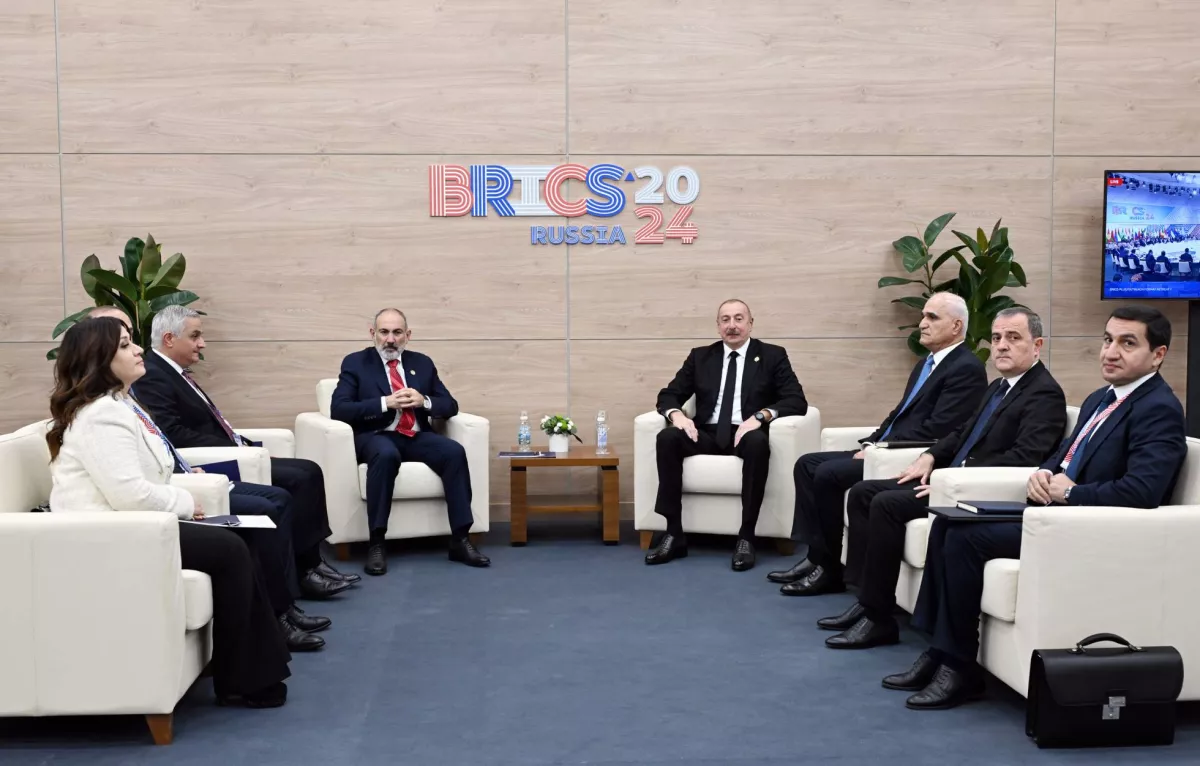BRICS summit: Western hegemony's fairy tale meets its end When carriages turn to pumpkins
The end of historical eras seldom unfolds as a dramatic clash between heroes and villains. Instead, these transitions are often less glamorous, marked by gradual shifts in power legitimized through pragmatic diplomacy and negotiation. This week’s BRICS summit in Kazan demonstrated this, as even the Western bloc grudgingly acknowledged the event’s success. In a notable shift, both US presidential candidates have stopped labelling one of BRICS' leading nations, China, as an adversary. The IMF has also conceded that, in the coming years, global economic growth will be driven largely by BRICS countries.
Moreover, the number of BRICS members and partners is expanding, with Azerbaijan moving closer to the bloc. Unlike the rigid demands of Western alliances that require members to cede sovereignty, BRICS allows for a multi-vector policy approach.
Nations seeking friendship with global hegemon
In assessing the scale of the recent BRICS summit held from October 22–24 in Kazan, one must consider the choice of both location and host. Russia, which has faced significant Western efforts to isolate it, hosted the summit – the most representative in the bloc's history. Delegations from 36 countries attended, including heads of the original BRICS nations (with the exception of Brazil) and UN Secretary-General António Guterres. Leaders from new members Egypt, Iran, the UAE, and Ethiopia were also present, along with representatives from countries engaging with BRICS, like Azerbaijan, Belarus, Kazakhstan, Kyrgyzstan, and even Armenia, as well as nations considering joining, such as Türkiye.
Notably, the president of South Africa and the prime minister of India chose the BRICS summit over the British Commonwealth meeting, a key event for the British elite seeking to preserve remnants of their empire. This choice underscored a pivot among major nations toward BRICS, moving away from traditional Western-centered alliances.

The history of BRICS is, in many ways, a revealing illustration of the fatal flaws in Western foreign policy. The bloc was established in the late 2000s by some of the world’s largest nations, who had repeatedly tried and failed to reach an agreement with the West on a "rules-based order." Importantly, these countries were not opposed to negotiation, and they had enough influence to assert their rights—after all, they included China, Brazil, Russia, India, and South Africa. For years, these countries saw BRICS as a secondary option in global politics, still holding out hope that they might resolve their differences with the global hegemon.
As non-Western nations continued to grow and strengthen, the collective West, rather than integrating these rising powers into the international structures and systems it had established, began pressuring them under the guise of defending "rights" or "democracy." Behind these pseudo-liberal slogans, Western countries launched an all-out effort to preserve their own hegemony, increasingly resorting to overt militarism. This approach was, to say the least, a curious strategy toward countries that together make up nearly half of the world’s population. It was also shortsighted, given the fundamental shift in economic and technological balance, which was steadily tipping away from the West. China is on the verge of becoming the world’s largest economy, and alongside other BRICS nations, it now controls vast economic resources that are starting to surpass those of the "collective West."
Moreover, the real GDP of some of these nations is undervalued due to low monetization of sectors such as insurance and healthcare, which are heavily monetized in the West. The technological achievements of these nations should not be underestimated either. Chinese advancements, for example, have raised such significant concerns in the US and EU that these countries have banned products from firms like Huawei and ZTE, fearing their rapid competitive edge.
Amidst the high-level meeting in Kazan, Bloomberg—a leading voice of Western financial capital—published a noteworthy analysis of IMF data on global economic trends. According to the report, the BRICS countries will drive global economic growth over the next five years, while the share of G7 nations (the core of the collective West) is expected to decline. China alone will contribute 21.7% to global growth, India nearly 15%, Russia 2.1%, and Brazil 2%. In stark contrast, the collective West shows much more modest projections: the US is expected to account for only 11.6% of global growth, Germany 1.7%, Japan 1.7%, the UK 1.4%, and France 1.4%. This outlook comes from the IMF and Bloomberg—sources hardly known for any sympathies toward BRICS nations.
What if it’s not a mistake?!
The US and its allies’ decision to confront BRICS countries, increasingly through military means, seems reckless—almost self-destructive. A prime example is the EU’s failed "Million Shells for Ukraine" initiative. As John Mearsheimer writes in The Great Delusion: Liberal Dreams and International Realities, American militarism—fueling direct wars and proxy conflicts worldwide—is not a temporary misstep by the global hegemon and its allies. Rather, it’s a defining feature of their "liberal hegemony" policy, which seeks to enforce a pseudo-liberal doctrine through force.

Building on Mearsheimer's argument, we see that Washington's policy, deeply ideological, has fused US interests with liberalism in a paradoxical way. This conflation explains why the "democratic" and "human rights" credentials of a country or movement are often assessed primarily on their submissive alignment with US interests. The more pliable a nation, the higher its approval in the eyes of American-led liberalism—a framework where democracy and freedom are defined by compliance.
When people claim that the collective West, unlike the supposedly "diverse" BRICS, shares common values, it’s pure nonsense. Surrendering sovereignty to the US isn’t ideological unity—it’s plain capitulation. The US’s willingness to accept such an arrangement reflects not shared ideals and values, but rather a semblance of them.
The diversity within BRICS is often exaggerated. Firstly, the group successfully adopted a 134-point declaration at the Kazan summit, addressing complex issues like the Middle East, Sudan, Afghanistan, and, to a lesser degree, Ukraine. Secondly, BRICS countries share a consensus around a positive vision of economic cooperation and the pluralism of political systems and ideologies—not an imagined collective hostility toward the West. The anti-Western sentiment is something the West projects onto BRICS, casting both the bloc and China as enemies. This is not the bloc’s actual foundation but a characterization imposed by the West.
Despair of the West
Thus, BRICS has a solid economic and ideological foundation that fuels interest in the bloc. Over 30 countries have expressed interest in joining, and a list of 13 candidate nations was agreed upon in Kazan. Many nations moving closer to BRICS, like Azerbaijan, aim to pursue a balanced, multi-vector foreign policy rather than engage in conflict with the global hegemon. A prime example is Türkiye, a leading NATO member, which intends to join the bloc. The same can be said for Saudi Arabia, a traditional US ally, not to mention other dynamic Asian nations like Indonesia.
In addition to geographical expansion, BRICS countries are actively working on building an independent infrastructure for economic cooperation among all member states. After the West began to misuse the roles of its currencies—particularly the dollar and euro—and the SWIFT payment system for political control and mass punishment of businesses and populations in disfavored nations, BRICS countries have started developing alternative solutions.
The collective West's reaction to the strengthening of this alternative bloc has been mixed, but it has offered little in terms of constructive engagement. On one hand, the US and its allies recognize that the processes related to the rebalancing of the global system are well underway, and the rise of China is now merely a matter of time and technical details. As a result, both US presidential candidates—Trump and Harris—have moderated their tones regarding China. Trump stated that he does not see Beijing as a straightforward enemy and believes he can "get along" with both China and Russia. Harris emphasized that the US "should not seek conflict" with China and reassured that they adhere to the "One China" policy, much to the dismay of Taiwanese separatists.
On the other hand, the collective West hopes to create divisions within BRICS, particularly between Beijing and Delhi. Indian Prime Minister Modi even left the Kazan summit slightly early for discussions with the German Chancellor about submarine purchases. In an effort to drive a wedge between key BRICS nations—India and China—the collective West is supplying India with advanced weaponry and whatever else it desires, inflating its ambitions to challenge Beijing. Chancellor Scholz did not disappoint, signing an unprecedented information-sharing agreement with Modi regarding Indian radical opposition abroad, particularly following the assassination of a Sikh activist in Canada by Indian intelligence. However, what do human rights and democracy matter in the face of the West's struggle to maintain its global dominance?

Add to this the increasingly desperate gestures from the global hegemon—such as threats directed at certain countries in the context of their rapprochement with BRICS. Against the backdrop of Türkiye's alignment with the bloc, a high-profile terrorist attack occurred there on Wednesday. The nature of the attack and its perpetrators suggest a political message from certain Western circles. The choice of target—the aerospace corporation TUSAS—is atypical for the Kurdish militants who carried it out; it appears more like a contracted job at the request of a backer. These militants operate in a de facto US-controlled area of Syria and northern Iraq, working closely with American military and intelligence agencies.

Another example of the reaction to rapprochement with BRICS is the increased US engagement in the normalization process between Azerbaijan and Armenia. This surge in US activity coincided with President Aliyev and Prime Minister Pashinyan’s plans to visit Kazan, prompting Washington to send ambiguous messages to the South Caucasus. US authorities are concerned that Azerbaijan might reach an agreement with Armenia without Western mediation, as Aliyev and Pashinyan indeed managed to engage in dialogue in Kazan.
Whatever the reaction of the "collective West" to the transformation of the international system, it is clear that while the phrase "the decline of the West" was once a poetic metaphor, and shifts in power were mostly internal to the Western camp, today, it represents stark statistics and mundane reality. The future of the planet is being shaped on platforms like BRICS and the Shanghai Cooperation Organization (SCO). The Azerbaijani leadership is actively engaging in these arenas—not in opposition to the West, but in pursuit of political pragmatism. In contrast, the Armenian government suffers from ideological myopia, adhering to the dogmas of "Euro-Atlanticism" rather than striving to build an inclusive region and promote peace.








